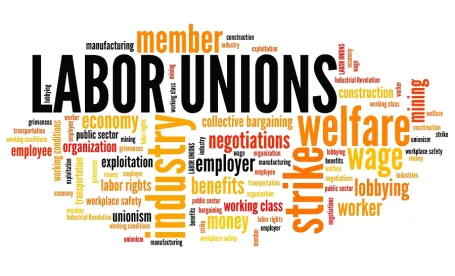Setting clear and reasonable standards for taking access to an employer’s private property is high on the National Labor Relations Board’s agenda. Not only is the Board talking about issuing formal rules in this area, but the Agency is cranking out new access decisions left and right, the most recent being its recent decision in Kroger Limited Partnership I Mid-Atlantic, 368 NLRB No. 64, dated September 6, 2019 (Kroger). The issue presented there was whether the National Labor Relations Act (NLRA or Act) requires an employer to grant nonemployee union representatives access to its premises to solicit the employer’s customers if it has also permitted other third parties to engage in civic, charitable or commercial solicitations there. The Board answered this question in the negative.
The facts in Kroger are straightforward. In April, 2015, a union representative entered the parking lot adjoining Kroger’s store No. 538 in Portsmouth, Virginia where he solicited the grocer’s customers to sign a petition protesting Kroger’s decision to close the store and to transfer union members to stores outside the area. Kroger responded to this trespass by calling the local police and asking them to stop the Union’s solicitation. Shortly thereafter, the police arrived on the scene and confronted the Union official who immediately ceased his solicitation and left Kroger’s premises. The Union then filed an unfair labor practice charge against Kroger, alleging that its ejection of the Union solicitor and its banning of union solicitation was discriminatory because the company had previously allowed other third parties to engage in civic solicitations there. According to the Union, this disparate treatment interfered with employees’ rights under the Act.
Reversing an administrative law judge’s decision finding a violation and overturning the established Board precedent upon which she relied, Sandusky Mall, 329 NLRB 618 (1999), the Board’s three Republican members dismissed the Union’s disparate treatment claim. They found that Kroger’s actions were lawful because the Company had a fundamental property interest in its premises that allowed it to exclude the Union’s solicitor and because the Union’s solicitations were not sufficiently similar in nature to other on-premises charitable, civic or commercial activities that Kroger had previously allowed. In the Board’s view, discrimination exists only when like or similarly situated cases are treated in a dissimilar manner. The Union’s solicitation of Kroger’s customers which it banned and the civic activities it had previously permitted were not of the same or similar nature. Accordingly, the fact that Kroger elected to ban the former, while permitting the latter did not present a case of actionable discrimination. Moreover, the Board went one step further, stating that its approach in Kroger, a case that had nothing whatsoever to do with union organizing, applied equally to nonemployee organizing activity. Accordingly, the Board said that it would also permit an employer to ban nonemployee access to private property for organizing purposes unless it had permitted comparable organizing activities by non-labor groups such as fraternal societies and religious organizations. However, civic, charitable or commercial solicitations by non-labor groups were not of the same or similar nature as union organizing. Therefore, that dissimilar type of solicitation would not license a union to engage in on-premises organizational activities over the objection of the property’s owner.
TAKEAWAYS:
-
Kroger is the third very recent Board decision to issue protecting employer property rights and limiting access by nonemployees and, in some limited instances, by employees. For example, in UPMC, 368 NLRB No. 2, dated June 14, 2019, the Board overturned other longstanding case authority granting unions a right of access to an employer’s “public spaces,” holding that an employer did not violate the Act when it ejected nonemployee union representatives from its cafeteria because the law does not require an employer to permit the use of its facility for third party organizing except when other avenues of communications with employee are not readily available. If you would like to read UPMC, please click here. Likewise, in Bexar County Performing Arts Center Foundation, 368 NLRB No. 46, dated August 23, 2019 (Bexar), the Board again overruled prior case law and held that a property owner need not grant access to off-duty employees of an onsite contractor to engage in a public demonstration against their employer, unless, again, no other avenue for communication with their desired audience exists. Bexar is available for viewing by clicking here.
-
Kroger is welcome news for employers operating in most states where private property rights trump union interests and property owners have an unbridled right to exclude whoever they want to from their property. Moreover, Kroger draws a clearer line between civic, charitable and commercial solicitations which do not open an employer up to unwanted union solicitation and organizational activities by non-labor groups that may give rise to an obligation to grant access to the employer’s property. Employers in these majority states and who honor the lines drawn by the Board in Kroger need not fear opening their premises to unwanted union solicitation.
On the other hand, in a small number of jurisdictions, including California, statutes and case law operate to subordinate an owner’s property rights to union interests by granting unions a right of access in the context of labor disputes and by stripping state courts of the power to enjoin or regulate union trespass in a variety of settings. Whether such state laws are constitutional remains an open question. However, unless and until such union-friendly state law is either repealed or invalidated, Kroger is not likely to change things in those minority jurisdictions. -
Likewise, that the Board required a sufficient likeness or similarity between banned and permitted solicitation before it will find disparate treatment is likely to spill over into other kinds of cases presenting issues of discrimination. Thus, absent direct evidence of an employer’s discriminatory intent, a mere differential in treatment may not be legally sufficient to establish disparate treatment discrimination. The General Counsel’s failure to establish that required sameness or similarity may, therefore, be grounds for a finding of “no discrimination.





 />i
/>i
